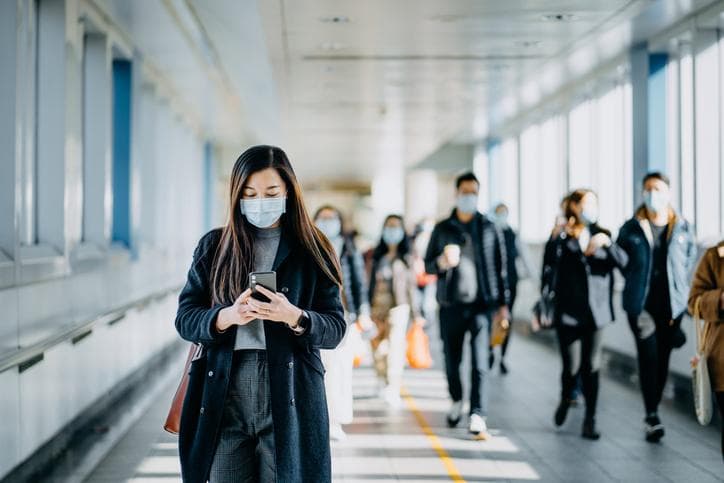
A look at mask use beyond legal requirements
Recent UK-based research explores psychological factors which motivate face mask use when legal mandates aren’t in place, providing valuable insights for public health campaigns.
27 February 2024
After the outbreak of the Covid-19 pandemic in 2020, the government brought in legal requirements to wear face masks in public places in order to minimise the spread of the virus. In England, masks were required on public transport and in shops and restaurants from June 2020 to July 2021, then reinstated in November 2021 after the rise of the Omicron variant. All such requirements were lifted in January 2022.
Research has identified several factors linked to adherence to mask mandates, however, it has been less clear which factors encourage people to protect themselves and other from infection by continuing to use masks when there is no legal requirement to do so.
This is the focus of a new paper in the British Journal of Health Psychology, in which Louise Smith and colleagues explore the psychological factors which lead people to continue to protect themselves with face masks, and provide potentially useful knowledge about how to promote protective health behaviours beyond legal requirements.
Data for this study was collected in several stages between July 2021 and April 2022, a period in which there were both no legal requirements and reinstated mandates in the wake of the Omicron variant. A total of 24,100 people aged 16 or over and living in England were repeatedly asked questions about a particular shop they had visited for essential goods in the last seven days, and how often they had worn a face covering when doing so, in 73 waves across this near year-long timeframe.
Participants shared how worried they were about Covid-19, as well as how big a risk they felt the virus was both to themselves and population of the UK in general, and how seriously ill they thought they would be, should they become infected. They also reported how likely they felt to encounter the virus in the next week, how effective they felt face masks were, "how confident" they were that they could wear one themselves, and to what extent their mask wearing would have on the spread of Covid-19. Though it remains a significant risk of even mild Covid-19 infections, concerns relating to long Covid were not probed in this research.
When there were no legal requirements in place, those who had higher levels of concern about Covid-19, saw it as a bigger risk to themselves and others, found it more plausible they could be exposed to the virus, or who felt mask wearing had a significant impact on spread were much more likely to wear a mask than those with lower levels of each factor.
Yet many of the participants stopped wearing face masks once the government indicated it was no longer legally required. Removal of mask mandates was associated with a 25% decrease in mask use when visiting shops and pharmacies, from 79.9% to 55%. When mask mandates were lifted, the team also observed that the relationship between the above psychological factors and actual masking behaviour were particularly strong, with two exceptions: people's belief in their ability to wear a mask, and their perceived exposure to COVID-19.
Overall, this suggests that knowledge about exposure risk and the severity of the virus, as well as the efficiency of masks, all play a significant role in encouraging appropriate masking practices when legal mandates are not in place.
While regulations clearly played a significant role in mask wearing behaviour earlier in the pandemic — and, again, the team argue that regulation should always be considered in circumstances which require them — this study illustrates they are not the only way to encourage people to mask up. Providing information about the risk of infection, as well as creating an environment in which people feel free and confident in choosing to mask up, may be useful to those looking to encourage mask uptake as the pandemic continues.
As with all self-report studies, it's always worth taking the results with a modicum of caution: people tend to over-report behaviour that puts them in a good light, meaning participants may have reported higher levels of mask usage than were strictly truthful. The authors note, however, that their data is in line with behavioural observations seen in other research – specifically, Davies et al.'s paper on the impact of "freedom day" on health protective behaviour in England.
The team also notes that "while case rates fluctuated over the course of the data collection period, the perception among most people in the United Kingdom was that the pandemic was ongoing." Recent public health messaging has downplayed the ongoing nature of the pandemic, meaning that the public's perception of their risk from Covid has, as the authors put it, "subsequently changed. Whether the associations we observed hold in the same way, while a government is encouraging people to return to 'business as usual', is unclear."
Read the paper in full.


